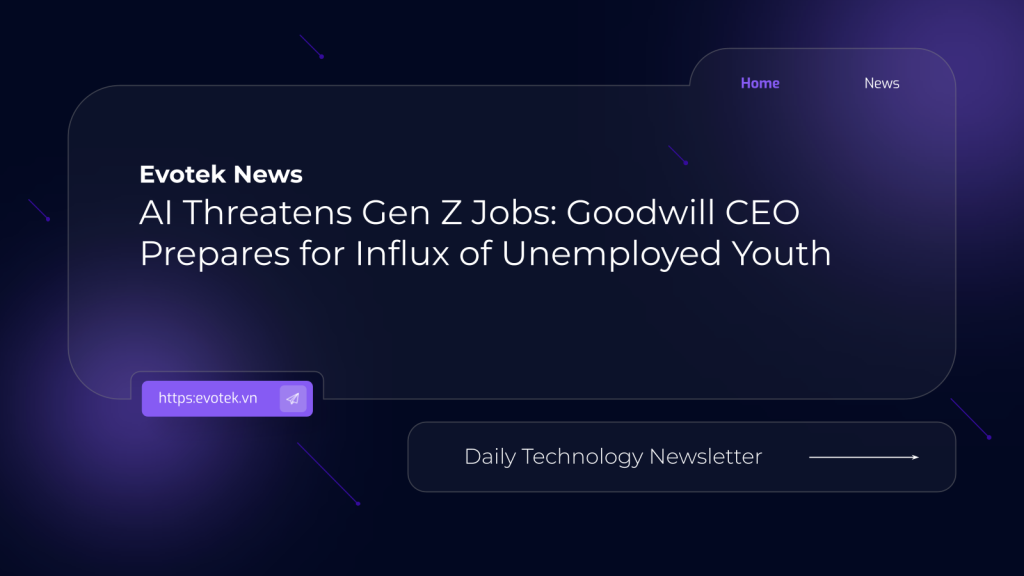Goodwill CEO Steve Preston is sounding the alarm, revealing that the charity’s employment services are gearing up for a significant surge in jobless individuals, particularly among Generation Z. The driving force? Artificial intelligence (AI) and automation, which he warns are already reshaping the job market.
Last year, Goodwill’s extensive network of over 650 job centers assisted more than 2 million job seekers. Now, Preston anticipates an even greater demand, specifically citing AI’s escalating impact.
AI’s Immediate Impact on Entry-Level Roles
While some tech leaders downplay AI’s potential to cause widespread job displacement, Preston asserts that the shift is already in motion. “We are preparing for a flux of unemployed young people—as well as other people—from AI,” he exclusively told Fortune. He highlights that low-wage and entry-level positions are most vulnerable to automation.
Preston, a former U.S. Secretary of Housing and Urban Development, confirms seeing “large organizations beginning to make significant layoffs based on a move to AI.” Call centers and sales roles, he notes, are currently experiencing the most severe repercussions.
“I don’t know that it’ll be catastrophic, but I do think we’re going to see a significant reduction in a number of jobs. I think it’s going to hit low wage workers especially hard,” Preston added.
Gen Z and the Education Divide
Entry-level jobs traditionally serve as crucial stepping stones for young people entering the workforce. However, Preston observes a growing difficulty for college students and, even more acutely, for young adults without college degrees, to secure these foundational positions.
Despite recent narratives suggesting that the value of higher education is diminishing due to skills-based hiring trends, Preston’s experience paints a different picture. “What I’m seeing is of the overall unemployment, people without college degrees have no jobs,” he stated, noting that young men are particularly affected.
This reality is “a terrible thing,” Preston explains, emphasizing the psychological toll on young individuals who struggle to envision a stable future or a career path where they can grow and thrive.
Beyond Entry-Level: A Looming Skills Gap
As AI and automation advance, the challenge of securing initial employment will likely extend even to graduates. Preston warns of a “knock-on effect” on more senior roles, not only from AI replacing mid-level positions but also from a potential lack of suitably skilled talent progressing through the career pipeline.
“Those entry-level roles were the places where they learned the foundations of a job—where they built core skills, where they had an opportunity to be mentored, and grew up in the organization,” Preston explained. The erosion of these opportunities means Gen Z students are already feeling unprepared, a problem exacerbated by a lack of internships and work experience.
Essential Skills for the Next Generation of Job Seekers
Rather than being overwhelmed by technological change, Preston advises young people to embrace and adapt to it. Goodwill actively collaborates with employers to identify the most in-demand skills for the future workforce.
The Digital Skills Imperative
“Digital skills are really critical,” Preston emphasizes. He clarifies that mere familiarity with social media apps differs significantly from genuine digital literacy required in the workplace. Young professionals need to master practical tools such as:
- Microsoft Excel
- Google Docs
- AI tools like ChatGPT and Gemini
“We consistently find that if people get a certain level of attainment with digital skills, the door is open wide—and many people that we assume have those skills, do not,” he noted. Proficiency in AI tools, no surprise, is increasingly allowing individuals to “leapfrog” others in the job market.
Clean Tech: A Path Without a Degree
For Gen Zers uninterested in traditional corporate careers, Preston suggests exploring clean tech skills. Areas like solar panel installation and electric vehicle (EV) charging station maintenance represent prime growth sectors that often do not require a college degree.
A Warning for All Ages and a Message of Hope
Preston extends a stark warning to older generations: “If you are someone seeking a job in your 30s—or even 40s—and you haven’t acquired those skills, you’re pretty much locked out of a massive percentage of the jobs that are available in the marketplace.”
However, his message is ultimately one of hope and empowerment. Reskilling and upskilling can dramatically transform career prospects. “When those people get those skills, we just see the doors busting open,” he shared, citing examples of individuals who, after extensive digital boot camps, transitioned from homelessness to roles at companies like Accenture and Google. “It’s never too late,” Preston affirms.

 日本語
日本語 한국어
한국어 Tiếng Việt
Tiếng Việt 简体中文
简体中文